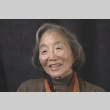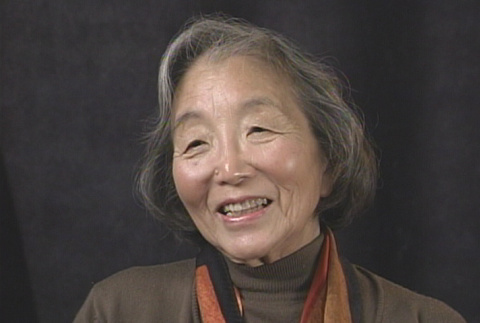129 items
129 items

vh
Kara Kondo Interview Segment 5 (ddr-densho-1000-139-5)
Impact of the Washington State alien land law on Japanese farmers

vh
Kara Kondo Interview Segment 3 (ddr-densho-1000-139-3)
Explanation of Japanese families' reasons for leasing Yakama reservation land

vh
Kara Kondo Interview Segment 23 (ddr-densho-1000-139-23)
Preparation for mass removal; awareness that some white community members were afraid to speak out on behalf of persons of Japanese ancestry

vh
Kara Kondo Interview Segment 29 (ddr-densho-1000-139-29)
Impact of mass removal on the Wapato Japanese community; a sergeant in charge of removal expresses sympathy, but "it was his job"

vh
Kara Kondo Interview Segment 39 (ddr-densho-1000-139-39)
Different experiences in Carlisle, Pennsylvania

vh
Kara Kondo Interview Segment 48 (ddr-densho-1000-139-48)
Political activism: League of Women Voters and serving on committees dealing with land use and water issues

vh
Kara Kondo Interview Segment 31 (ddr-densho-1000-139-31)
Description of living quarters at Heart Mountain concentration camp, Wyoming

vh
Kara Kondo Interview Segment 40 (ddr-densho-1000-139-40)
Working in Louisville, Kentucky; husband encounters discrimination when trying to enlist in the Army Air Corps

vh
Kara Kondo Interview Segment 25 (ddr-densho-1000-139-25)
Helping parents prepare for removal; selling and discarding household items

vh
Kara Kondo Interview Segment 34 (ddr-densho-1000-139-34)
Thoughts on military service and the so-called "loyalty questionnaire"

vh
Kara Kondo Interview Segment 1 (ddr-densho-1000-139-1)
Father's family background: immigration to the U.S., settled in the Yakima valley

vh
Kara Kondo Interview Segment 6 (ddr-densho-1000-139-6)
Community events in the Yakima valley: church services, sports, and cultural groups

vh
Kara Kondo Interview Segment 36 (ddr-densho-1000-139-36)
A visit by Caleb Foote and Gordon Hirabayashi

vh
Kara Kondo Interview Segment 14 (ddr-densho-1000-139-14)
Varying ways for the Issei to acquire land


vh
Kara Kondo Interview Segment 11 (ddr-densho-1000-139-11)
Description of photographs of early family life

vh
Kara Kondo Interview Segment 13 (ddr-densho-1000-139-13)
Difficult life for Issei in the early 20th century: "they were pioneers in the Yakima valley"

vh
Kara Kondo Interview Segment 33 (ddr-densho-1000-139-33)
Working as a "society editor" for the "Heart Mountain Sentinel"

vh
Kara Kondo Interview Segment 19 (ddr-densho-1000-139-19)
A frightening incident of racially motivated violence

vh
Kara Kondo Interview Segment 20 (ddr-densho-1000-139-20)
An early period of independence: attending a design school in Seattle

vh
Kara Kondo Interview Segment 55 (ddr-densho-1000-139-55)
Reflections on September 11, 2001, current activities, hopes for the future

vh
Kara Kondo Interview Segment 51 (ddr-densho-1000-139-51)
First hearing of losses suffered by Japanese American families as a result of incarceration

vh
Kara Kondo Interview Segment 54 (ddr-densho-1000-139-54)
Thoughts on redress: hoping for a positive outcome, writing a letter to President Ronald Reagan before the appropriations were made

vh
Kara Kondo Interview Segment 42 (ddr-densho-1000-139-42)
Feeling unwelcome upon returning to the Yakima valley after the war

vh
Kara Kondo Interview Segment 47 (ddr-densho-1000-139-47)
Postwar involvement in political organizations: League of Women Voters, Human Rights Commission
